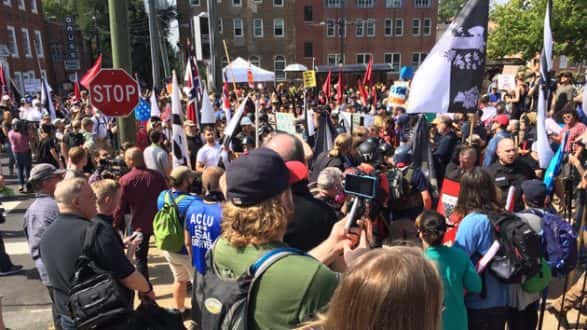
 Twitter/VSPPIO (WASHINGTON) — The aftermath of a white nationalist rally in Charlottesville, Virginia, turned deadly on Saturday after a 20-year-old Ohio man allegedly accelerated his car into a crowd of counter-protesters, killing a 32-year-old woman and wounding several others.
Twitter/VSPPIO (WASHINGTON) — The aftermath of a white nationalist rally in Charlottesville, Virginia, turned deadly on Saturday after a 20-year-old Ohio man allegedly accelerated his car into a crowd of counter-protesters, killing a 32-year-old woman and wounding several others.
Conflict in the college town, however, has been brewing for months. Here’s a brief timeline of the events this year that led to this weekend’s deadly crash:
February and March
The Charlottesville City Council voted in February to remove a statue of Confederate general Robert E. Lee from what was then called Robert E. Lee Park.
May 13
A group of at least 100 white nationalists carried torches in Charlottesville while protesting the removal of the Lee statue, provoking anger and frustration from politicians, and an outcry on social media from those who viewed the display as an attempt to intimidate minorities.
Mike Signer, the city’s mayor, expressed his disgust with the protest in an interview with ABC News.
“I think it’s horrific,” he said. “We’re a city that proudly values our diversity.”
Prominent white nationalist Richard Spencer was among the marchers that day.
June 5
Signer announces that Robert E. Lee Park has been renamed Emancipation Park.
Aug. 11
White nationalists holding tiki torches marched through the University of Virginia campus in Charlottesville ahead of the so-called “Unite the Right” rally, a gathering of white supremacists staged in part to demand protection for the statue of Lee.
The men chanted “white lives matter,” “you will not replace us,” and the Nazi-associated phrase “blood and soil.” Some white nationalists brawled with counter-protesters at the scene of the rally.
Police arrived on campus, declared it an unlawful assembly, and ordered the crowds to disperse. But the skirmishes, as well as images of the marching that were posted on social media, contributed to an atmosphere of tension that opened up into violence the next day.
Aug. 12: Morning
Although the “Unite the Right” rally was scheduled to start at noon, violence between white nationalists and counter-protesters began in the morning.
State police reported injuries, and soon after, the city declared an unlawful assembly at Emancipation Park.
Virginia Gov. Terry McAuliffe declared a state of emergency shortly before noon.
Aug. 12: Afternoon
At 1:42 p.m., an Ohio man allegedly rammed a car into a crowd of people who were demonstrating against the white nationalist gathering.
About an hour and a half later, Signer confirmed in a tweet that at least one person had died in the day’s violence. It later emerged that a 32-year-old woman, Heather Heyer, was killed when the car hit the crowd. At least 19 others were injured.
Hours later, President Trump appeared from his Bedminster Golf Club to denounce the violence, but was quickly assailed for not admonishing white nationalist and Nazi groups immediately.
“We condemn in the strongest possible terms this egregious display of hatred, bigotry and violence on many sides — on many sides,” the president said. “It’s been going on for a long time in our country. Not Donald Trump. Not Barack Obama. It’s been going on for a long, long time.”
Aug. 12: 5 p.m
Two Virginia State Police troopers, Lt. H. Jay Cullen and Trooper-Pilot Berke M.M. Bates, died while lending air support to respond to the deadly violence unfolding in Charlottesville. Their helicopter crashed seven miles southwest of the city.
Aug. 12 to 13
Vigils and marches of solidarity are held throughout the country in remembrance of Heyer and against white nationalism.
Aug. 14
James Alex Fields Jr. of Maumee, Ohio, was charged with one count of second degree murder, three counts of malicious wounding and one count of hit-and-run for allegedly plowing into the crowd. The Department of Justice also opened an investigation into the incident.
Beckoning to criticism for failing to denounce white supremacists or label the Charlottesville car ramming as an act of terrorism, two days after the incident Trump made a strong statement against groups he believed were responsible for Saturday’s bloodshed.
“Racism is evil,” Trump said. “And those who cause violence in its name are criminals and thugs, including the [Ku Klux Klan], neo-Nazis, white supremacists and other hate groups that are repugnant to everything we hold dear as Americans.”
Copyright © 2017, ABC Radio. All rights reserved.










